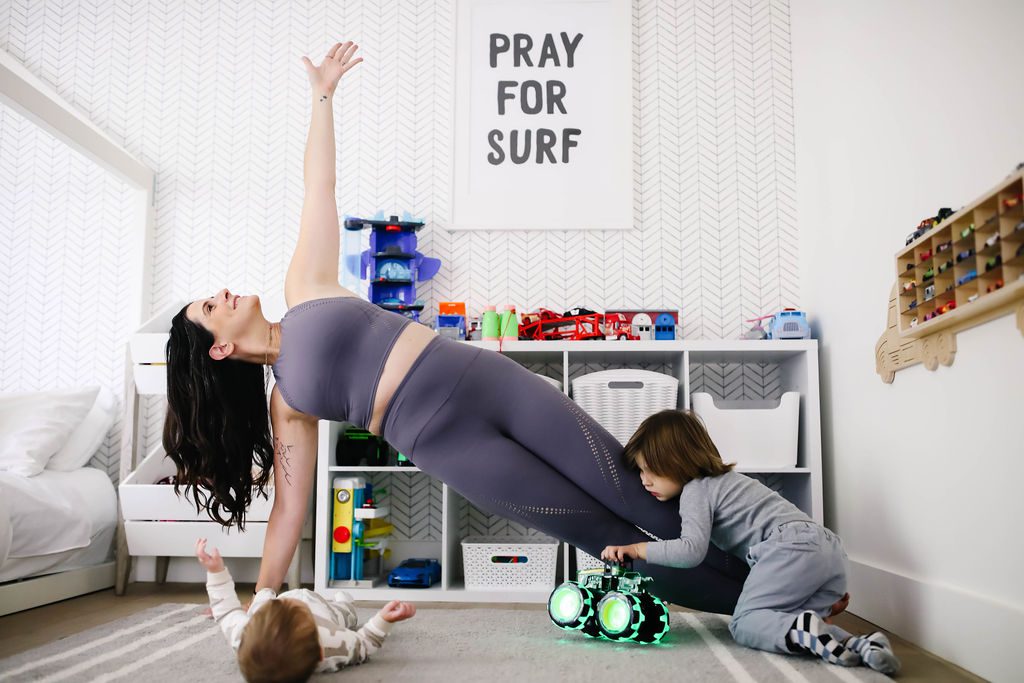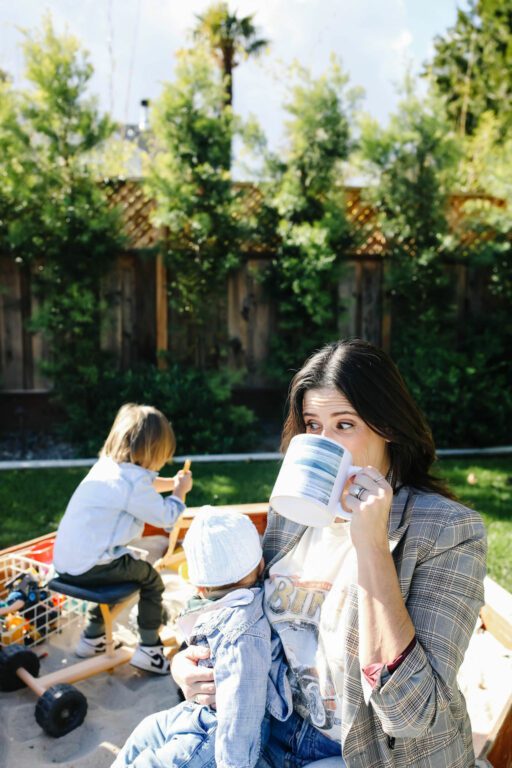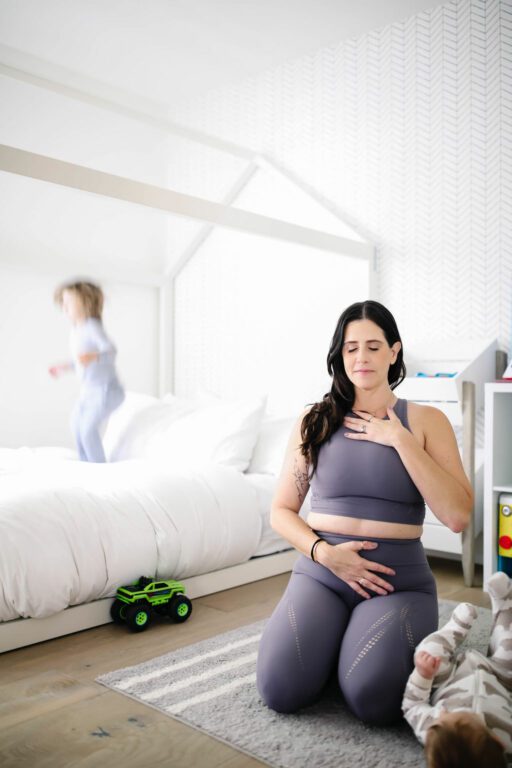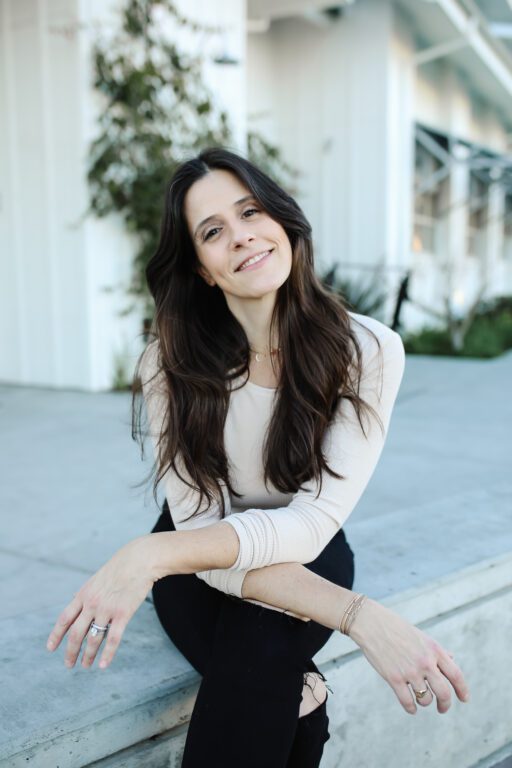
Did you miss the chance to hit the mat today due to your parenting duties? Sarah Ezrin suggests that if you’ve been caregiving, you’ve done your yoga. In honor of the release of her new book, The Yoga of Parenting (Shambhala, 2023) Sarah Ezrin has shared a free lecture on Wanderlust TV that says that if you were in the parenting role instead of pigeon pose, you were still doing yoga. We’ve excerpted a chapter of the new book below, and you can peep our writer’s review of the book here.
Boundaries for Breakfast
I start setting boundaries from the second my alarm goes off in the morning. Boundaries come in all shapes and forms. I think many of us assume that boundaries are just something we set with another person or how much of our personal lives we share with the world (think of the saying “That person has no boundaries”), but most days, before the sun even begins to rise, I have already set boundaries with myself, my husband, my children, my work, my family, my friends, and even our dog.
Setting boundaries is a way to protect my most precious resource: my energy—both how and where it is being spent. They are a way for me to mitigate how much of myself I am giving to something or someone since my impulse is to give everyone and everything my all. And they are constantly shifting. Just because I feel one way today or need to focus my attention in one area does not mean that I will feel the same tomorrow. Just because I feel the need to draw a hard line this month or, conversely, be totally loose about something, does not mean I will do it that way again next month.
The very first boundary I set most days of the week is making the choice to wake up well before the rest of the world so I can meditate and write. It is a boundary I set with myself but also with others, in that it means I go to bed much earlier than most and am not generally available for any outside responsibilities early in the mornings, including emails or work meetings. Getting up early gives me time to fill my cup, both literally, as in getting to enjoy my tea hot (which is impossible once my kids are awake), and metaphorically, in that I spend those wee hours of the morning doing whatever I want to do. I write. I sit quietly. I cuddle with my dog (though as mentioned, there are many mornings I even have say to him, “Not now, dude. I need a little space.”).
Being able to focus entirely on each of these things without distraction or other people needing me transforms each task into a ritual. I would even dare to say that they become my yoga practice, my sadhana. Notice that no mat is needed. But just because my morning time is special does not mean that I am beholden to it. In fact, I am much more forgiving with myself than I was years prior.
For many years in early adulthood, my boundaries with myself were incredibly rigid. It began in early college around my studies and eating and quickly bled into every other area of my life. Even when I started to get “healthier,” as in practicing yoga, my self-discipline bordered on masochism. I would force myself through hard-core asana practices, regardless of if I had the energy. I would withhold any pleasure from myself in the form of food or even relationships. In prioritizing my body’s size, asana practice, and career, I ended up denying myself the joy of living.
 Ironically, during that same time, the boundaries I held with other people seemed almost nonexistent. I would absorb my family members’ pain and struggles and insert myself into everyone’s problems. There was a reason I pursued psychology for as long as I did, including beginning to get my Masters Degree in marriage family therapy: I thought it was my job to “fix” everyone. I would also say yes to commitments that I knew in my heart I didn’t want to fulfill, prioritizing others’ disappointment over my own mental health. Between my extraordinarily strong personal boundaries and incredibly porous social boundaries, there was little to no balance.
Ironically, during that same time, the boundaries I held with other people seemed almost nonexistent. I would absorb my family members’ pain and struggles and insert myself into everyone’s problems. There was a reason I pursued psychology for as long as I did, including beginning to get my Masters Degree in marriage family therapy: I thought it was my job to “fix” everyone. I would also say yes to commitments that I knew in my heart I didn’t want to fulfill, prioritizing others’ disappointment over my own mental health. Between my extraordinarily strong personal boundaries and incredibly porous social boundaries, there was little to no balance.
Since starting a family, I have tried to swing myself in the exact opposite direction. Nowadays, I try to be softer with the boundaries I hold around myself but tighter with the boundaries I have around others. I find this balance to be more sustainable when I have people relying on me 24/7. For example, I will allow myself to sleep past my alarm if I need to and skip my asana practice if I am exhausted (something I would not have dared to do a decade ago!). I am much more willing to draw a hard line and say no when asked to do something for someone that doesn’t feel authentic. My two new favorite words are “Google it.”
Healthy boundaries are living, breathing things. They exist along a spectrum because we always need to adjust one way or the other to find new ways to balance. There are some periods in our lives when our boundaries need to be firm, others where they need to be more malleable.
Can we be present and aware enough of what we need right now in this moment to know when to make those adjustments?
When an Overachiever Becomes a Parent
As I implied earlier, my yeses and nos have always been a bit backward when it comes to differentiating my personal life from my work life. Just before I met my husband, I was so burned out and overworked that my health was affected. I would binge and purge every weekend and then restrict and overexercise all week (and this is when I was “healthy”). I would go months without a day off, unable to say no. Sometimes I would teach a class just minutes after major life events, like deaths in the family or breakups, barreling through the intense emotions with work instead of taking the time to process.
When an injury prevented me from not only teaching asana but also practicing it (the two things I had rigidly come to define my entire life by), things began to soften for me. First, my injury was so bad that I had to pull out of some work commitments, something I had never done in my entire teaching career at that point. For a people-pleaser, my work commitments are like blood oaths. Surely my saying no would ruin my career and I would lose any new opportunities and never travel for teaching again.
Spoiler alert: none of that came true.
Instead, fast-forward to seven years later: I am happily married with two beautiful boys, and I can honestly say that in learning how to balance what I say yes to and no to, my career has been able to thrive right alongside my family.
Would I be deeper into my leg-behind-the-head poses had I kept prioritizing my asana over my relationships and developing a family? Possibly, but I would not trade newborn and toddler cuddles for shoving my leg behind my head for anything.
No is not a Bad Word
It’s not easy, learning how to say no to those you love the most. Some brain researchers say that we are hardwired to associate the word with negativity and that opposite parts of the brain fire when hearing no versus yes. I know many parents who try to never say the word to their children. I try to set positive limits in other ways, for example, by acknowledging what my kids can do or explaining why something may not work right now, versus just saying no outright. They say a toddler hears no four hundred times a day, so I get the hesitation, but may I suggest something perhaps a bit controversial?

What if saying no is not necessarily a bad thing? What if saying no is a necessity? What if we could retrain our brain to understand that saying no is really saying yes to something else? Most often yourself? As Anne Lamott sums up in her hilarious and raw book Operating Instructions: A Journal of My Son’s First Year, “‘No’ is a complete sentence.” The author and activist Glennon Doyle also explained this well in a recent episode of her We Can Do Hard Things podcast, saying that a big part of mitigating one’s tendency to people-please is “having the intellectual honesty to know that every ‘yes’ is a ‘no’ and every ‘no’ in a ‘yes.’”
This is absolutely true for me. When I’m saying yes to please everyone else, I am ultimately saying no to my own needs. This then leads me to feel overwhelmed and overcommitted. My work suffers and my relationships suffer when my self-care suffers.
Our children also learn boundaries through our modeling—both how to set them and how to disrespect them. I am already seeing clear evidence that my eldest, Jonah, even as a toddler, is requesting to set his own boundaries, and I work hard to respect those. For example, when we have people visit or we go stay with family, he (much like me) loses steam after a few days in and needs a break from all the social engagements. When he couldn’t speak yet, he would tell me by needing constant contact with me, acting much more relaxed when lying together quietly in a dark room versus when he was the center of attention (that part of him is not like me). Now that his verbal skills are better developed, he literally asks to stay in bed some days or to stay home versus going out somewhere or being around other people.
Can we respect our children’s boundaries when they request them? Can we take no as a complete answer when they don’t want to do something we have asked them to do? Like physical affection toward a family member, eating certain foods, or not wanting to go somewhere we had planned for them? Where is the line between setting your own limits and listening to your child’s needs?
This is where the connection piece of empathic parenting comes in. If we are in tune with our child’s needs, then we can gauge on that particular day and in that particular moment if we are able to acquiesce; or if it happens to be a day when our child is just being unnecessarily difficult to assess, what/if any limit needs to be set and enforced. Remember to return to all of the skills we honed in part one of the book, such as becoming sensitive to life-force energy (both yours and your child’s). Practice grounding in your body and/or breath. Observe the fluctuations of your nervous system. Remember that any one of these simple actions (if not all) can help us become more connected with our children and therefore be clearer on what our children truly need, so we can say yes to their no.
From The Yoga of Parenting by Sarah Ezrin © 2023. Reprinted in arrangement with Shambhala Publications, Inc. Boulder, CO.
–
 Sarah Ezrin is an author, world-renowned yoga educator, and content creator based in the San Francisco Bay Area, where she lives with her husband, two sons, and their dog. Her willingness to be unabashedly honest and vulnerable along with her innate wisdom make her writing, classes, and social media great sources of healing and inner peace for many people. Sarah is a frequent contributor to Yoga Journal and LA Yoga Magazine as well as for the award-winning media organization, Yoga International. She also writes for parenting sites Healthline-Parenthood, Scary Mommy, and Motherly. She has been interviewed for her expertise by the Wall Street Journal, Forbes Magazine, and Bustle.com and has appeared on television on NBC News. Sarah is a highly accredited yoga teacher. A world traveler since birth, she leads teacher trainings, workshops, and retreats locally in her home state of California and across the globe.
Sarah Ezrin is an author, world-renowned yoga educator, and content creator based in the San Francisco Bay Area, where she lives with her husband, two sons, and their dog. Her willingness to be unabashedly honest and vulnerable along with her innate wisdom make her writing, classes, and social media great sources of healing and inner peace for many people. Sarah is a frequent contributor to Yoga Journal and LA Yoga Magazine as well as for the award-winning media organization, Yoga International. She also writes for parenting sites Healthline-Parenthood, Scary Mommy, and Motherly. She has been interviewed for her expertise by the Wall Street Journal, Forbes Magazine, and Bustle.com and has appeared on television on NBC News. Sarah is a highly accredited yoga teacher. A world traveler since birth, she leads teacher trainings, workshops, and retreats locally in her home state of California and across the globe.
